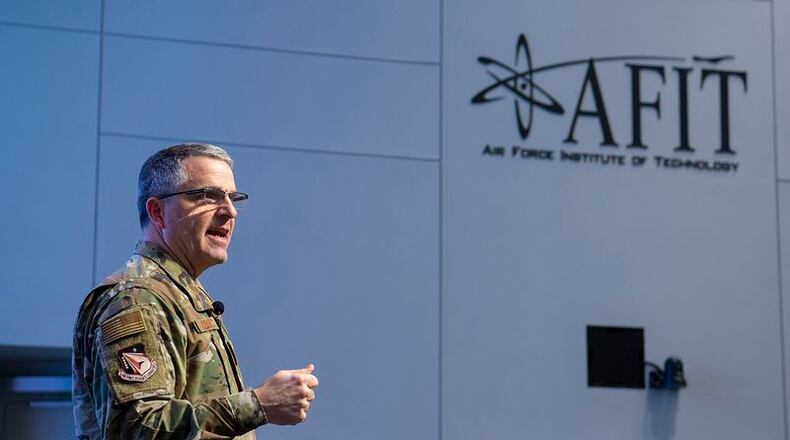Prosecutors and defense attorneys during closing statements Friday offered Air Force Judge Col. Christina Jimenez dueling accounts of what happened between Cooley and his sister-in-law in a Jeep in August 2018.
After hearing three hours of closing arguments and a rebuttal, Jimenez began her deliberations. No jury was empaneled.
Government attorneys painted a picture of a high-ranking officer stewing in fantasies about his sister-in-law before committing abusive sexual contact during and after a Jeep ride.
“‘I’m so very sorry for my actions on the night of 12 August … I violated you both and broke trust … Frankly, I’m stunned at my deplorable actions,’” government attorney Lt. Col. Matthew Neil said, quoting part of a written message from Cooley to his brother and sister-in-law.
“That’s not a narrative,” Neil said in more than 90 minutes of his closing statement at Wright-Patterson Air Force Base. “Those are his own words.”
Cooley, former commander of Air Force Research Laboratory (AFRL), has pleaded not guilty, and his defense team has argued that the encounter was consensual.
“‘We kissed,’” defense counsel Maj. Shea Hoxie told Jimenez in his closing argument, quoting part of the sister-in-law’s voicemail message to Cooley the day after the events in question.
“It was a mutual encounter,” Hoxie said.
The complainant in the case, the wife of Cooley’s brother, is a civilian woman who is not a Department of Defense employee. Cooley’s brother works for the Air Force in New Mexico.
The charge of abusive sexual contact had three specifications involving how the two-star general is alleged to have touched the complainant — forcing his tongue in her mouth, forcing her hand to his genitals and pushing his hand between her legs and cupping her breast, according to the Air Force charge sheet.
‘She didn’t ask for it’
Aug. 12, 2018 was “the inflection point,” the prosecutor said. That was the day of a Cooley family-and-friend gathering, a barbecue around a backyard pool at the brother and sister-in-law’s Albuquerque, N.M., house.
Cooley “was fantasizing about having sex with her in that pool,” Neil said.
He also argued that a deleted email found on Cooley’s computer confessed to a growing attraction to his sister-in-law in recent years.
“This was an email he sent to himself and deleted,” Neil said.
In 2018, when Cooley’s sister-in-law drives Cooley to his parents’ house to retrieve belongings, the major general shocks her, asking, “Have you ever fantasized about me? I’ve been fantasizing about you for a couple of years,’” Neil recounted to the judge.
When they pulled into the garage afterwards, before she could unlatch her seatbelt, Cooley from the passenger seat pushes his sister-in-law against the inside of the door and “shoves his tongue into her mouth,” cupping her breast and pressing his hand against her genitals through her clothes, Neil said.
Why didn’t she scream about what happened, Neil asked rhetorically. “Hindsight is 20/20. It’s easy to judge her today. But nobody knows how they’re going to handle that situation.”
Taking aim at a core defense argument, Neil insisted that the words “We kissed,” convey nothing about her lack of consent.
“She didn’t ask for it,” Neil said. “She didn’t want it. And this voice mail doesn’t show she did.”
Defense: ‘She impeaches herself’
One of Cooley’s Air Force defense attorneys, Hoxie, argued that evidence of Cooley’s innocence sat on his phone until it was turned in to the Air Force Office of Special Investigations (OSI) some 18 months later — three voicemails from his sister-in-law totaling 12 minutes she sent to Cooley a day after the events in question.
The sister-in-law said her “biggest regret in this case is that voice mail … because she accidentally memorialized the truth forever.”
“I think you’re an amazing man, and I’m immensely proud of you,” Cooley’s sister-in-law said in part of her message to him, a message Hoxie replayed in court.
In the recording, she adds: “I love you.”
“She impeaches herself in the voice mail,” Hoxie said. “She impeaches herself in this entire proceeding.”
“Why don’t they report then and there? Because there’s nothing to report. No crime has occurred,” Hoxie said, referring to their report to OSI in December 2019.
Hoxie urged the judge to go through all of the emails and voicemails that the Cooley family exchanged.
“When you do, the narrative just falls apart,” he said.
About the Author

